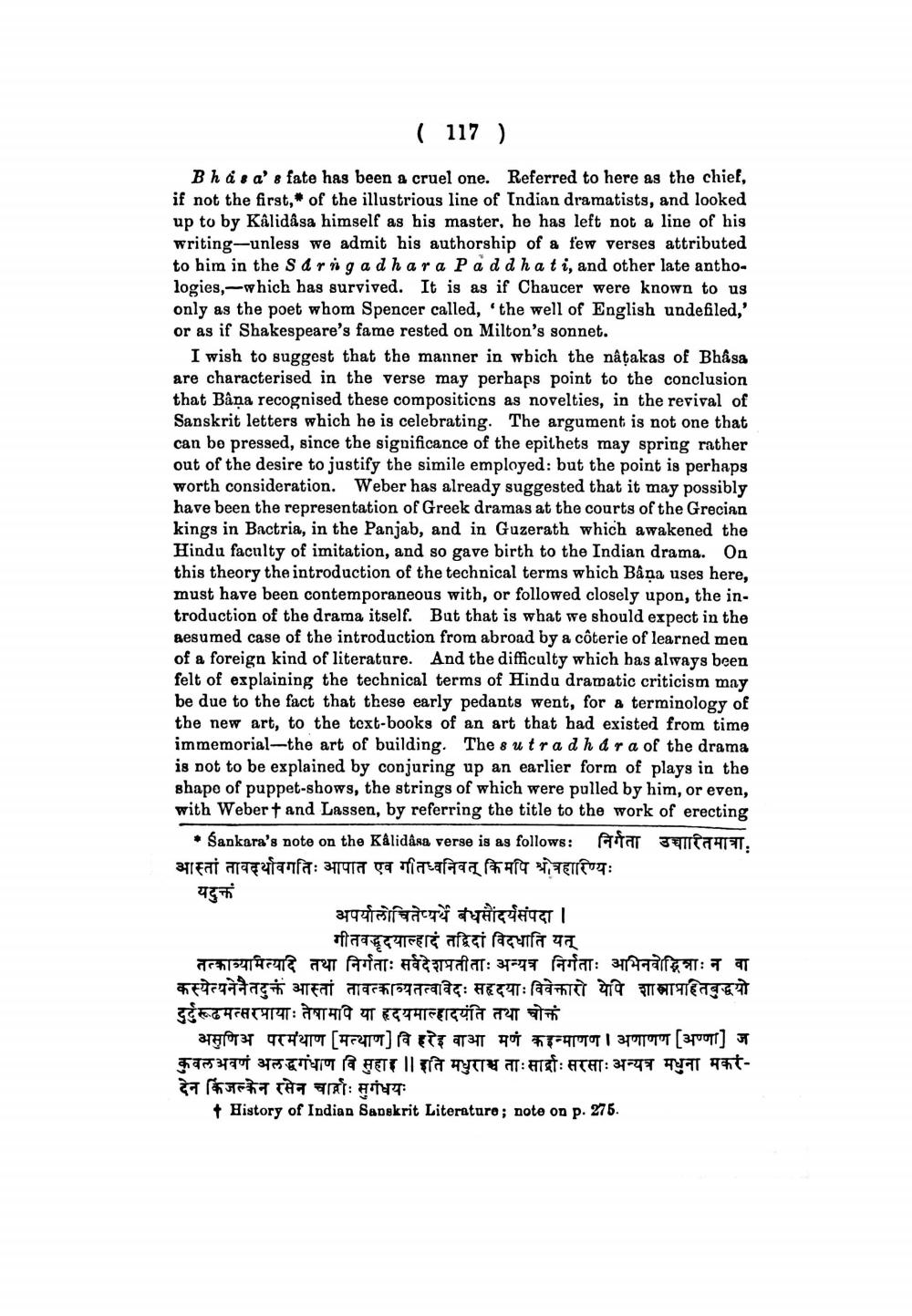________________
( 117 )
Bhasa's fate has been a cruel one. Referred to here as the chief, if not the first, of the illustrious line of Indian dramatists, and looked up to by Kâlidâsa himself as his master, he has left not a line of his writing-unless we admit his authorship of a few verses attributed to him in the Sárngadhara Paddhat i, and other late anthologies, which has survived. It is as if Chaucer were known to us only as the poet whom Spencer called, 'the well of English undefiled,' or as if Shakespeare's fame rested on Milton's sonnet.
I wish to suggest that the manner in which the nâṭakas of Bhâsa are characterised in the verse may perhaps point to the conclusion that Bâna recognised these compositions as novelties, in the revival of Sanskrit letters which he is celebrating. The argument is not one that can be pressed, since the significance of the epithets may spring rather out of the desire to justify the simile employed: but the point is perhaps worth consideration. Weber has already suggested that it may possibly have been the representation of Greek dramas at the courts of the Grecian kings in Bactria, in the Panjab, and in Guzerath which awakened the Hindu faculty of imitation, and so gave birth to the Indian drama. On this theory the introduction of the technical terms which Bâna uses here, must have been contemporaneous with, or followed closely upon, the introduction of the drama itself. But that is what we should expect in the aesumed case of the introduction from abroad by a côterie of learned men of a foreign kind of literature. And the difficulty which has always been felt of explaining the technical terms of Hindu dramatic criticism may be due to the fact that these early pedants went, for a terminology of the new art, to the text-books of an art that had existed from time immemorial-the art of building. The sutra dhá ra of the drama is not to be explained by conjuring up an earlier form of plays in the shape of puppet-shows, the strings of which were pulled by him, or even, with Webert and Lassen, by referring the title to the work of erecting
Sankara's note on the Kâlidâsa verse is as follows: निर्गता उच्चारितमात्रा: आस्तां तावदर्थावगतिः आपात एव गतिध्वनिवत् किमपि श्रोत्रहारिण्यः
यदुक्तं
अपर्यालोचितेप्यर्थे बंधसौंदर्यसंपदा ।
गीतवद्धृदयाहारं तद्विदां विदधाति यत्
तत्काव्यमित्यादि तथा निर्गताः सर्वदेशप्रतीताः अन्यत्र निर्गताः अभिनवोद्भिन्नाः न वा कस्येत्यनेनैतदुक्तं आस्तां तावत्काव्यतत्वविदः सहृदयाः विवेक्कारो येपि शास्त्राप्रहितबुद्धयो दुर्दुरूढमत्सरप्रायाः तेषामापे या हृदयमाल्हादयंति तथा चोतं
अणि परमथाण [ मत्थाण] वि हरेइ वाआ मणं कइन्माणण । अणाणण [अण्णा ] ज कुवलभवणं अलद्धगंधाण वि सुहाइ || इति मधुराश्च ताः सार्द्राः सरसाः अन्यत्र मधुना मकरंदेन किंजल्केन रसेन चार्शः सुगंधयः
History of Indian Sanskrit Literature; note on p. 275.




